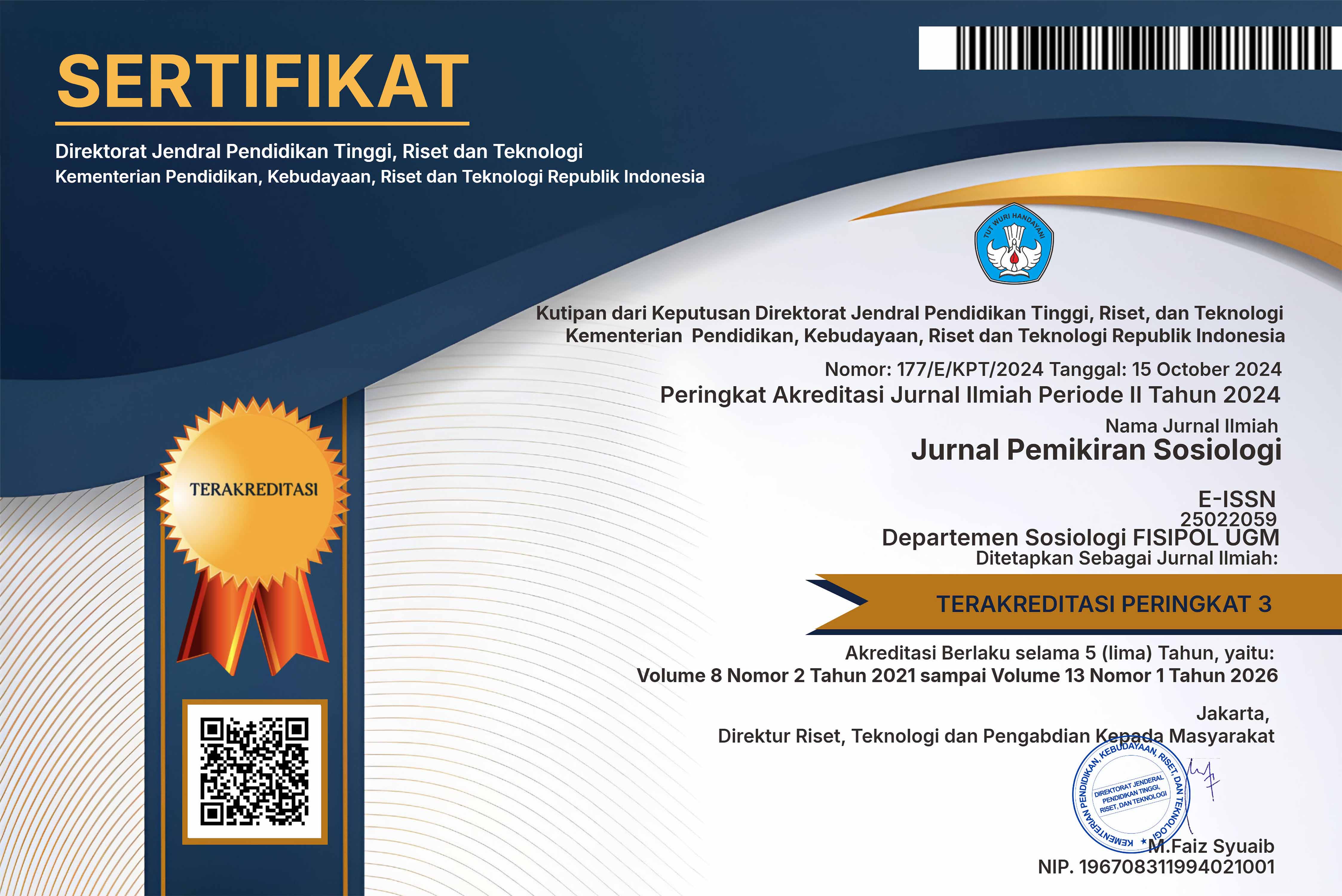Lifeworlds of Natural Farmers in Japan
Tsuchiya Shoma(1*)
(1) Graduate School of Agriculture, Kyoto University, Japan
(*) Corresponding Author
Abstract
Alternative agriculture should not be narrowly defined as a chemical-free farming system that simply excludes prohibited inputs. Rather, it represents a comprehensive philosophical and ideological framework incorporating political and social dimensions. Both alternative and conventional agriculture are rooted in ideological orientations that reflect agriculture’s societal role. However, the farmers’ motivations for adopting specific practices extend beyond social or ideological factors. An examination of individual farmers’ lives and worldviews reveals that the meaning they derive from agricultural practices often transcends socioeconomic considerations. This paper employs Schutz's concept of the 'Lifeworld' to examine the underlying motivations and practices of natural farming. This study conducted interviews with five natural farming practitioners. First, it elucidated their perceptions of the reasons why agricultural practitioners refrain from using fertilizers. Subsequently, it revealed observational records of their off-farm activities and living environments to examine their relevance to agricultural practices. The results revealed that farmers adopt natural farming according to their lifeworlds, which are based on supra-scientific thought systems such as religion and spiritual cosmologies; that lifeworld dynamically coexists with the modern world within agricultural contexts; and that living spaces and off-farm leisure activities provide insights into the construction and expression of farmers' lifeworlds. In conclusion, analysing farmers' practices through their lifeworlds offers an approach to aligning their self-identity and self-realization with agricultural practices or rural lifestyles in modernised societies.
Keywords
Full Text:
PDFReferences
Akitsu, Motoki., et al. 2016. Ningen to sakumotsu: saishu kara saibai e. [Humans and plants: from foraging to farming.] Japan: Domesu Press.
Arai, Yuki. 2014. Hatake kara Uchu ga Mieru: Kawaguchi Yoshikazu to Shizen-nou no Sekai. [Seeing the Universe from the Farm: Kawaguchi Yoshikazu and the World of Natural Farming.] Japan: Takarajima Press.
Ariyoshi, Sawako. 1979. Hukugo Osen. [Combined Pollution.] Japan: Shinchosha Press.
Gliessman, Stephen R. 2014. Agroecology: The Ecology of Sustainable Food Systems. Florida: CRC Press.
IFOAM. 2021. "The Four Principles of Organic Agriculture." Germany: International Federation of Organic Agricultural Movement. Retrieved August 20, 2024 (https://www.ifoam.bio/why-organic/shaping-agriculture/four-principles-organic).
Ishikawa, Takuji. 2008. Kiseki no Ringo: Zettai fukanou wo kutsugaeshita nouka kimura akinori no kiroku. [Miracle Apple: The Record of Kimura Akinori, a farmer who overturned the 'absolute impossibility.] Japan: Gentosha Press.
Kasubuchi, Tatsuaki. and Arao Hidenori. 2021. Shizen to no kyousei wo mezasu kome-zukuri: Edo jidai ni manabu shin nousho. [Rice Farming in Symbiosis with Nature: Learning from the Edo Period.] Japan: Shinnosho Press.
Kimura, Akinori. 2011. Kiseki wo okosu: mienaimono wo miru chikara. [Miracles: The power to see the invisible.] Japan: Fusosha Press.
Kimura, Takeshi. 2012. "Philosophy of Nature Farming: The case of Masanobu Fukuoka." Area studies Tsukuba 33. Retrieved August 20, 2024 (https://tsukuba.repo.nii.ac.jp/record/27471/files/4.pdf).
MAFF. 2024. "Green Food System Strategy." Japan: Ministry of Agriculture, Forestry and Fisheries. Retrieved August 20, 2024 (https://www.maff.go.jp/j/kanbo/kankyo/seisaku/midori/).
Masugata, Toshiko. 1995. "Environmental Sociology and Development of Organic Agriculture Movement." Journal of environmental sociology 1. Retrieved August 20, 2024 (https://doi.org/10.24779/jpkankyo.1.0_38).
Matsumura, Kazunori. 1995. "Thought and Practice in the Japanese Organic Farming Movement: Toward an alternative approach to fieldwork which would lead to a change in the attitudes of Sociologists as a socially constructed 'Body'." Japanese sociological review 45(4). Retrieved August 20, 2024 (https://doi.org/10.4057/jsr.45.437).
Nakajima, Kiichi. 2017. "Critique of Japanese organic agriculture in retrospect during the first 15 years of the 21st century." Japanese Journal of Organic Agriculture Science 9(2). Retrieved August 20, 2024 (https://doi.org/10.24757/joas.9.2_29).
National Association for the Promotion of Natural Farming. 2012. "About Natural Farming." Japan: National Association for the Promotion of Natural Farming. Retrieved August 20, 2024 (https://www.jnhfa.com/about_farming/index.html).
Obara, Hiroko. and Kunihiro, Akiyama. 2014. "The Limit and Direction of Natural Farming." Bulletin of the Faculty of Agriculture, Kagoshima University 64. Retrieved August 20, 2024 (https://ir.kagoshima-u.ac.jp/record/9124/files/No. 64_p15-25.pdf).
Okada, Mokichi. 1953. Shizen noho kaisetsusho. [Natural Farming Manual.] Japan: Sekaikyuseikyo Press.
Okamoto, Yoritaka. 2021a. Mu hiryo saibai wo jitsugen suru hon. [A book to realize natural farming.] Japan: egao-shobo Press.
Okamoto, Yoritaka. 2021b. Zoku Mu hiryo saibai wo jitsugen suru hon. [Continued A book to realize natural farming.] Japan: egao-shobo Press.
Schutz, Alfred. 1974. The problem of social reality: Collected Papers I. Germany: Springer Press.
Shimada, Masamichi. 2020. Kojiki to Kototama: Kototama genri yori mita Nihon to sekai no rekishi to sono mirai. [Kojiki and Kototama: The History of Japan and the World and its Future from the Principle of Kototama.] Japan: Kototama-no-kai Press.
Sugioka, Yoshihiko. 2018. "Mokichi Okada's Statement on "Medicinal Toxin": Critical Considerations of its Religious and Medical Meaning." Religion and ethics 18. Retrieved August 20, 2024 (http://jare.jp/admin/wp-content/uploads/2019/01/Sugioka-religion-ethics18.pdf).
Sugiyama, Shuichi. 2013. Sugoi hatake no sugoi tsuchi: Mu noyaku mu hiryo shizen saibai no seitaigaku. [Amazing Soil and Amazing Fields: Ecology of Pesticide-Free, Fertilizer-Free, Natural Farming.] Japan: Gentosha Press.
Taniguchi, Yoshimitsu., et al. 2023a. Yuki nougyo wa koshite hirogatta: Hito kara chiiki e, chiiki kara jichitai e. [This is how organic agriculture spread: From people to communities and from communities to local governments.] Japan: Commons Press.
Taniguchi, Yoshimitsu. 2023b. "Sociology of Food and Agriculture in Japanese Contexts: Big Opportunities and Big Barriers." Annual reports of the Tohoku Sociological Society 52:5-18.
Thompson, P. B. 2015. From Field to Fork: Food Ethics for Everyone. British: Oxford University Press
Article Metrics
Refbacks
- There are currently no refbacks.
Copyright (c) 2025 Jurnal Pemikiran Sosiologi

This work is licensed under a Creative Commons Attribution-ShareAlike 4.0 International License.
Jurnal Pemikiran Sosiologi Indexed by:
ISSN 2252-570X (Print), ISSN 2502-2059 (online).

















